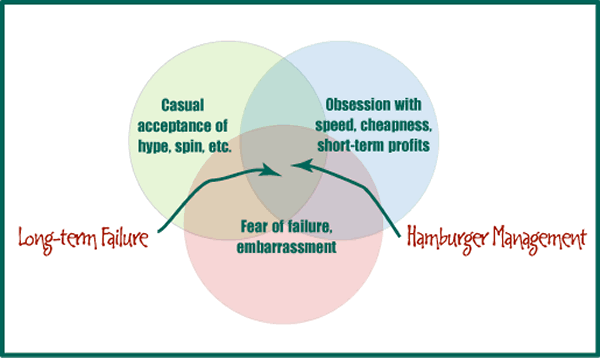Thoughts about honesty

I don’t agree with everything in this article (it’s too kind to conventional management ideas, for a start), but it’s still an interesting read (See clips below). But I do agree that honesty has a power and a credibility that lying, hype, and spin can never match.Why has honesty become so endangered? Mostly because so much in today’s world of management is not working well, but no one wants to own up to the fact and face changes.
There are maybe a few people who lie for the fun of it, but I don’t honestly think that’s a common trait. Most people who lie do so because they think that it’s the best option: the only way they can imagine out of a situation that’s going to be worse if people discover the truth. They lie to save themselves time, trouble, or embarrassment. By doing so, they often store up even greater problems for the future. But, given most people’s constant short-term viewpoint, they don’t consider that.
Without honesty, there cannot be trust. Without trust, everything in the corporate world is harder to accomplish. Sadly, Hamburger Managers have been induced to believe that you can replace trust (which takes time, honesty, and openness), with instant answers, such as money incentives, threats, bullying, and constant harassment. Honesty doesn’t figure in macho management styles because those styles nearly always have too much to hide.
Hamburger Management is putting style before substance, in the hope that doing so will lead to quick results that cost little or nothing. Take all the mania about lowering costs. Sure, doing so will hike profits (for a time), but only so long as sales remain the same. If cutting costs lowers quality and usefulness, and sales fall, you’ve just shot yourself in the foot. Making a better product, providing a better service, even if it costs more, may well drive sales up by much more that the extra cost. Those profits are much more secure and long-term ones.
One of the most tarnished rituals of the corporate year is the performance appraisal. It ought to be about honest, two-way feedback. It’s more often about fudging problems, concealing screw-ups, finding ways to avoid paying a salary increase, or producing “evidence” to justify firing people. Everyone hates it and nobody trusts it. So why do it? Because having some kind of “justification” for subsequent management action will, hopefully, ward off legal reprisals. Because it allows central management to control costs (especially salary costs) by fixing “standards” that limit increases, regardless of actual performance. Just about everyone knows that the results are fixed in advance. How would you feel about elections that were rigged? That’s about the amount of honesty and credibility many people attach to performance appraisal results.
We live in a world where hype, spin, and other euphemisms for lying have become accepted. Is this a sign of civilization? You won’t ever stamp out dishonesty and lying, but I see no reason to encourage either by dignifying it with the status of a management technique. Lying is lying, whether politicians, marketers, HR professionals, or senior executives do it.
One of the truest is honesty is not just the right thing to do, but the perhaps the most potent weapon in business. Honesty has become an endangered species. Yet it’s incredibly potent, whether the news is good or bad. “We cannot meet the deadline.” “That is my best offer.” “You’re hired.” “You’re fired.” Honesty isn’t just the right thing. It’s effective. But rare.
Conversely, witness the spate of tarred executives from once-respected companies, who massaged, inflated, and drastically altered financial statements to make things seem better than they were, or hide their own personal excesses. Enron, Tyco, Adelphia Cable, HealthSouth, WorldCom, and others still in court.
The fact is, there’s no such thing as a good liar. Just think of how many lies have you been told today? “He’s in a meeting.” “ That’s our best price.” “It’s guaranteed for life.” “ You have my word on it.” “That stock is sure-thing.” “This won’t hurt a bit.” “ Your call is very important to us.”
Labels: business ethics







4 Comments:
It's true regarding lies. The most common situation for people to lie is probably to avoid humiliation. Since it's our instinct to protect ourselves, I think it's out of impulse to lie just to save ourself from humiliation.
Thanks for your comment, Pamela.
I agree. I think that most lies are not premeditated in any way. They just pop out to avoid being humilated or put under pressure.
Keep reading, my friend.
Great post.
I think lies are a part of our lives and our community. No matter what we do, there's always something that opposes it.
Without lies, there would be no balance.
Thanks for your comment, Howie.
Perhaps there are "honest" lies (the kind that just pop out in moments of stress or are told to save someone's feelings), "questionable" lies (the ones that are carefully planned in advance and used for selfish advancement), and "downright dishonest" lies (the kind that are told maliciously to harm others).
What do you think? All would be present all the time, but some might be much more tolerable than others.
Keep reading, my friend.
Post a Comment
<< Home